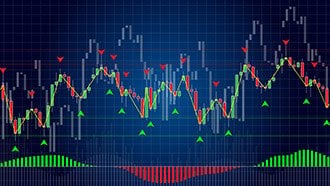The options market may seem to have an overwhelming amount of numbers and ratios at first. But today we're going to make this far less intimidating.
We're going to show you the single number that matters more than any other in options trading.
Our last post on trading options involved the "Greeks." These are parameters that help traders determine which options trade is best for their particular strategy.
 They are labeled with Greek letters - delta, gamma, theta, and vega - that describe how fast an options contract is likely to move over time. And they change as the underlying stock moves, or as volatility changes.
They are labeled with Greek letters - delta, gamma, theta, and vega - that describe how fast an options contract is likely to move over time. And they change as the underlying stock moves, or as volatility changes.
They're important, to a degree. But there is one factor that is even more important for efficient execution of any strategy.
Liquidity.
Liquidity tells us how easy it is to buy or sell an asset without affecting its price. The more liquid an asset is, the greater number of shares or contracts you can buy or sell without worrying about getting your order filled.
7-Day Cash Course: With the secrets in this video series, you could potentially start collecting anywhere from $1,190, $1,313, and even $2,830 in consistent income - each and every week. And it can be yours for only $1...
Illiquid markets have wide bid-ask spreads, so the price you expect to pay may not be the price available in the market. And, of course, that can become an even greater problem when you try to sell.
Illiquid markets also cannot absorb large orders, because there are not enough traders on the other side. In other words, if you want to sell 1,000 shares of a stock, there may not be enough buyers to buy them all. The price you get will have to be lower to attract more buyers.
You see, even though you might not have 1,000 shares of a stock for sale yourself, the sum of shares of all sellers could easily be greater than demand. This is especially critical when some sort of bad news comes out and a lot of people want to sell in a hurry.
How Do We Measure Liquidity?
[mmpazkzone name="in-story" network="9794" site="307044" id="137008" type="4"]
For stocks and most other assets, we typically measure liquidity as the number of shares traded each day. The greater the number, the easier it is for investors to buy and sell according to their expectations.
Options, however, are a derivative market. So the more liquid the underlying stock, the more liquid the option may be.
But it does not stop there.
Unlike in stocks, where shares outstanding is relatively constant, options are created and retired all the time. Therefore, we can also measure liquidity by the number of contracts (called open interest) that exist on any given strike price and expiration combination.
The more contracts that exist, the more likely it is that there are traders willing to buy and sell.
It is important to look at the combination of volume and open interest to gauge whether an option is liquid.
Remember, there are so many options combinations possible that volume and open interest are spread around, often quite thinly. You will not see the same volume for the underlying stock and any one of its options.
Therefore, the best plan for most investors is to only trade options on liquid stocks and then look for specific options that are near the money. Those are options that have strike prices close to the current trading price of the underlying stock. The farther away the strike, the less liquid the options will likely be.
So, what exactly is a good combination of volume and open interest?
Unfortunately, there is no answer that works for every option. The best plan is to start with highly liquid stocks, since they are likely to have the most liquid options.
From there, be sure there is at least some volume and open interest in the specific options you wish to trade.
You Can Learn How to Trade Like the Pros - for Just $1
America's No. 1 Pattern Trader, Tom Gentile, is giving you a rare opportunity to learn how to amass a constant stream of extra cash - year in and year out.
And he's going to teach you how to do it entirely on your own.
People have paid up to $30,000 to access his secrets... but it can all be yours for only $1.
Go here to claim your seat in America's No. 1 Pattern Trader Cash Course...


